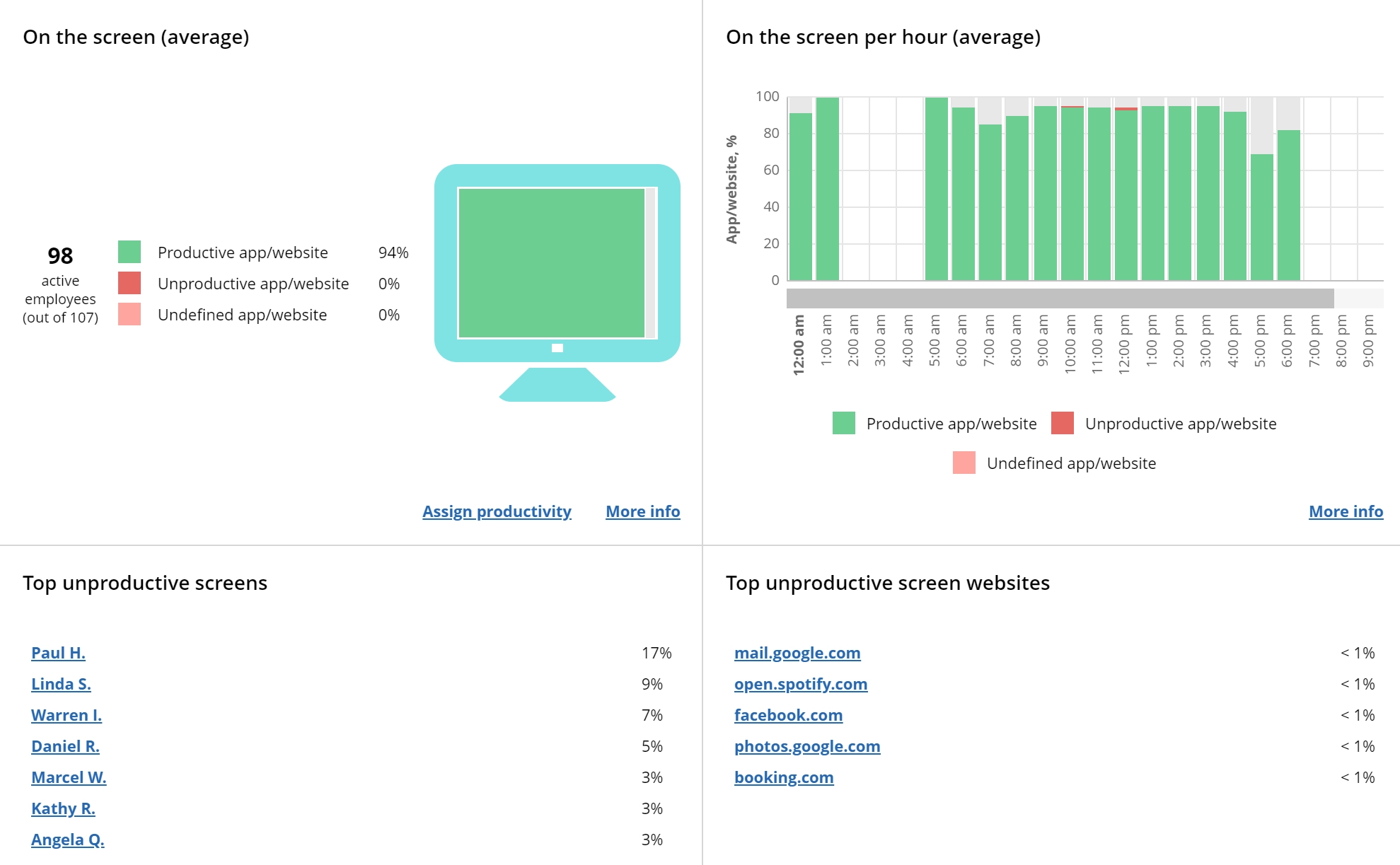Boost Productivity Respectfully: Non-Intrusive Alternatives to Screen Capture Monitoring

Screen monitoring has become essential in modern work environments, particularly with the shift towards remote and hybrid models. Many companies utilize screen capture tools to ensure productivity. But is this the best way to enhance employee performance?
Overview of screenshot-based monitoring
Screen capture employee monitoring is a popular tool used by managers and business owners to ensure employees meet their job requirements. What are the key features offered by screen monitoring?
-
Monitoring employees through screenshots
This feature automatically captures a sequence of screenshots throughout the day, providing a visual record of employee activity on their devices. It helps monitor productivity, workflows, and adherence to company guidelines.
-
Recording employee computer screens
This functionality records the entire session of an employee's computer, enabling managers to review all actions taken on work devices throughout the day.
-
Live screen monitoring
Live screen monitoring provides real-time visibility into employee activities, allowing for immediate feedback and quick action on any productivity issues.
While screen capture monitoring might initially appear beneficial, this invasive approach can lead to decreased team productivity over time.
Is screen capturing truly beneficial?
Many businesses adopt screen capture employee monitoring tools to get a comprehensive view of employee activities. Although this provides benefits like real-time task tracking, instant performance insights, and early risk detection, it also has potential disadvantages.
-
Privacy issues. Regular screen capture monitoring can make employees feel their privacy is compromised, potentially leading to stress and dissatisfaction.
-
Reduced trust. Intrusive monitoring methods like screen capture are often perceived as micromanagement, causing employees to feel untrusted as their actions are closely watched.
-
Incomplete data. Screenshots alone may not provide enough context to fully understand employee activities, complicating accurate KPI measurement.
-
Time-consuming. Reviewing multiple screenshots takes time, creating additional tasks for managers.
WorkTime’s non-intrusive screen productivity monitoring: an ethical alternative to invasive screenshots
WorkTime offers a non-intrusive approach to productivity monitoring, serving as an alternative to traditional screen capture. This tool tracks productivity metrics without capturing images or video, creating a more respectful and effective solution.
Top 3 benefits of non-intrusive monitoring
-
Privacy protection. Unlike screen capture employee monitoring, non-intrusive tools focus on work tasks rather than screen content, providing managers with performance insights without violating privacy.
-
Enhanced productivity. Without real-time screen monitoring or frequent screenshots, employees often feel more trusted and motivated, resulting in a positive work atmosphere. WorkTime’s experience shows potential productivity boosts of up to 40% with this approach.
-
Valuable insights. Non-intrusive monitoring provides meaningful data on KPIs such as app usage, active hours, and attendance, allowing managers to gain actionable insights without the clutter of excessive screenshots.
Conclusion
Screen monitoring can support productivity, compliance, and team management, especially in remote and hybrid settings. However, too much surveillance can damage employee trust, impacting morale and productivity in the long term. Privacy-focused solutions like WorkTime’s non-intrusive monitoring offer a balanced approach, promoting performance while respecting employee privacy.
Related Posts
The Rise and Fall of Julius Caesar: A Tale of Ambition and Betrayal
Julius Caesar, a name that echoes through the corridors of history as one of ancient Rome's most prominent and controversial figures. His life, marked by ambition, military genius, and ultimate betrayal, is a tale that continues to captivate and intrigue. The Ascent of Ambition Julius Caesar was born in 100 BCE into...
Read MoreFrom Scrolls to Stones: How Museums Document Biblical History
The Bible is more than just a collection of sacred texts—it’s a living document that has shaped centuries of religious, cultural, and historical movements. For thousands of years, it has been passed down through oral traditions, written manuscripts, and monumental inscriptions. The story of how these texts came to be,...
Read MorePertinax: The Brief Respite in Rome’s Chaotic Succession Crisis
The latter part of the 2nd century AD was a period of profound instability for the Roman Empire. The capricious and tyrannical reign of Commodus had left the empire in a state of disarray. His assassination in 192 CE ushered in a chaotic period often referred to as the Year...
Read MoreCareer Guide: Construction Managers – Building Careers in the Built Environment
Construction managers are the masterminds behind the successful delivery of building and infrastructure projects. They ensure that every phase of construction — from initial design planning to the final handover — is carried out efficiently, safely, and in compliance with all regulations. As pivotal leaders in the construction sector, they...
Read MoreDigital Assets and the Holy See: How the Vatican is Adopting Blockchain & Crypto Technology and NFTs
Introduction The Vatican has started experimenting with blockchains and non-fungible tokens (NFTs) technology integration around the world to engage new audiences and culturally patrimonial preservation of Ancient Greece and Rome. This initiative, which began with the Vatican Apostolic Library and NTT DATA Italia, is one of the first on Web3 attempts...
Read MoreThe Colossal Footprint: Exploring the Roman Empire at its Greatest Extent
The Roman Empire, a name that evokes images of gladiatorial combat, sprawling aqueducts, and stoic emperors, wasn't just a powerful state; it was a colossal empire that stretched across continents. But how vast was its reach at its zenith? This post delves into the greatest extent of the Roman Empire,...
Read More






















